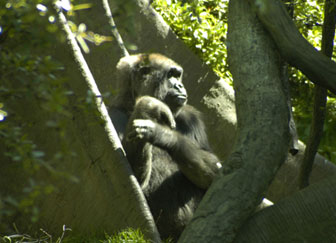Time running out for world’s rarest gorilla
Time running out for world’s rarest gorilla
mongabay.com
June 21, 2007
Time is running out for the world’s rarest subspecies of gorilla, the Cross River gorilla (Gorilla gorilla diehli) from the mountainous border region between Cameroon and Nigeria. With less than 300 individuals remaining, conservationists have drawn up a new plan to save the great ape from extinction.
Titled the Regional Action Plan for the Conservation of the Cross River Gorilla and published by Conservation International, the report is the result of a workshop held last year in Calabar, Cross River State, Nigeria, and presents an assessment of these endangered gorillas and a series of recommendedations for protecting it from habitat loss and poaching.
“Although the situation looks dire for the Cross River gorilla, it is far from hopeless,” said Dr. James Deutsch, director of WCS’ Africa Program. “At first glance, the population seems to be fragmented, but we have evidence of occasional migrations between some of the locations, a finding that improves the prospects for saving these gorillas.”
 Gorilla gorilla gorilla. Photo by Rhett A. Butler Gorilla gorilla diehli is one of two subspecies of western gorilla, the other being Gorilla gorilla gorilla, the western lowland gorilla. The eastern gorilla includes the eastern lowland gorilla (Gorilla beringei graueri), and the famous mountain gorillas of the Virunga Mountains and southern Uganda (Gorilla beringei beringei). |
The plan calls for the development of community-based conservation activities including ecotourism; improved management of existing protected areas and establishment new protected areas; awareness-raising campagins on behalf of the region’s unique biodiversity; and improved law enforcement in the Cross River gorilla’s range.
“If enacted, this program will serve as a strong foundation for Cross River gorilla conservation through a series of local and regional partnerships and activities,” said Dr. John Oates of Hunter College of the City University of New York, the lead author of the action plan. “The governments of Nigeria and Cameroon have already laid some of the groundwork for this transboundary conservation effort, and we’ve already secured about one-third of the funding needed for the action plan through government and donor support.”
The authors estimate the costs of the plan ay $4.6 million over a five-year period.